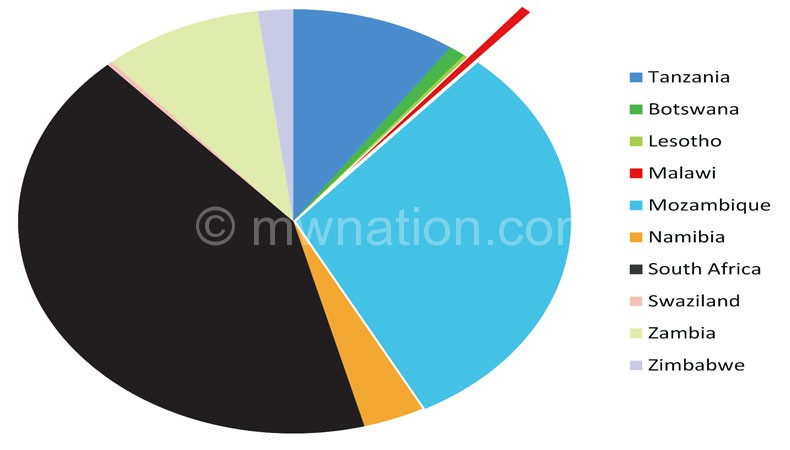Malawi FDI slumps 10% to $118m

Malawi underperformed in the attraction of Foreign Direct Investment (FDI) in 2013, luring about $118 million (K48 billion) about 10 percent lower than the previous year’s level of $129 million (K53 billion), according to a report.
The United Nations Conference on Trade and Development (Unctad) 2014 Investment Report released on Tuesday shows that Malawi attracted less than one percent of the total FDI inflows in Southern Africa.
The report indicates that Malawi trailed neighbouring Mozambique which attracted $5.9 billion, Zambia $1.8 billion and Tanzania $1.9 billion.
Malawi also received $129 million worth of FDI in 2012, about 2.4 percent of all investments that flowed into Southern Africa.
In 2007, said the report, FDI inflows stood at $124 million and rose to $195 million in 2008 before slumping to $49 million in 2009. It eventually picked up to $97 million in 2010 and rose to $129 in 2011 and 2012.
While some analysts contend that most of the FDI into the neighbouring countries was in extractive industries—gas, oil and minerals—others point out that Malawi still needs to overhaul the doing business environment.
In 2012, Malawi signed a $1 billion investment deal over a period of three years with Brazil’s Vale for the construction and rehabilitation of a rail line that will transport 18 million tons of coal from Moatize in Mozambique via Malawi to Nacala Port.
The analyst, however, agree that Malawi misses out on economic growth and job creation due to the lower FDI levels.
In the State of the Nation Address last week Tuesday, President Peter Mutharika noted that the business environment in Malawi has, in recent years, deteriorated due to some macroeconomic, security and structural challenges.
He said this has led to several economic problems, including low volume of FDI, low industrial output and unsustainable structural trade deficit.
Mutharika said in view of this, his government will strive to address the challenges by carrying out some regulatory and institutional reforms aimed at addressing constraints affecting enterprise.
Malawi has over the past years, been performing poorly on ease of doing business and global competitiveness.
The country plummeted 10 steps to 171 out of 189 economies on the 2014 World Bank Doing Business Report.
In 2013, Malawi crashed seven steps to 144 out of 148 economies on the World Economic Forum (WEF) Global Competitiveness Index with foreign currency regulations, access to financing and tax rates hindering business operations.
But the Malawi Investment and Trade Centre (Mitc) public relations manager Deliby Nyale earlier this year said government has embarked on a number of private sector reforms and has been proactive in opening up to the private sector.






The question is why is Malawi such a perennial underperformer? On a macro level, yes government can do better with increased incentives that can mitigate against perceived risk by investors etc. There is a lot that can be done within local industry – for example local banks can not over compensate themselves with 47% interest on business loans without justification of risk. If banks colluded to form a business friendly consortium that lends debt capital and collateral for other foreign investors. I am writing out of experience, trying to invest a modest amount in productive industry but needed asset acquisition capital